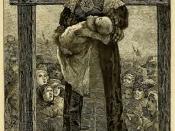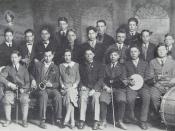Keep in mind that for feminist criticism patriarchic societies define gender roles based on biological sex functions, and that these roles and the rules that follow them are completely man-made, not God-given. The Puritans, one such society, gave symbolic meaning to all natural phenomena, and in this we can see how superstitious and ignorant they were for all their professed moral enlightenment. Their concepts of women can be traced to archaic myths of female fertility and the earth. The earth, seen as a parallel of female fertility, had to be controlled, civilized, and ruled over by man. Consequently, so did women.
An interesting quote within the essay mentions how witchcraft was a male invention, born of the fear of sexually powerful or independent women who represented forces that needed to be "tamed." Hence, man fears what he doesn't understand, and out of fear comes the need to control the threat, posed in this case by women.
Now, in The Scarlet Letter, the forest outside the town represents a "moral wilderness", a place where laws as man has created them do not exist. Even the terrain is stubborn, as demonstrated in Governor Bellingham's failure at gardening. A big pumpkin is all that the earth will give him. According to the essay, "Vegetation that overruns its boundaries emblematizes unrestrained female sexuality, which is believed to know no limits or boundaries."
Another example for showing how the novel presents nature as a symbol of female independence is the rose bush outside the prison door. The rose bush was thought to have sprung up under the foot steps of Anne Hutchinson. Hutchinson was the founder of the antinomian sect, which means "against the law." Pearl, when interrogated by the Pastor about her origins, says her mother plucked her from that rose bush.


